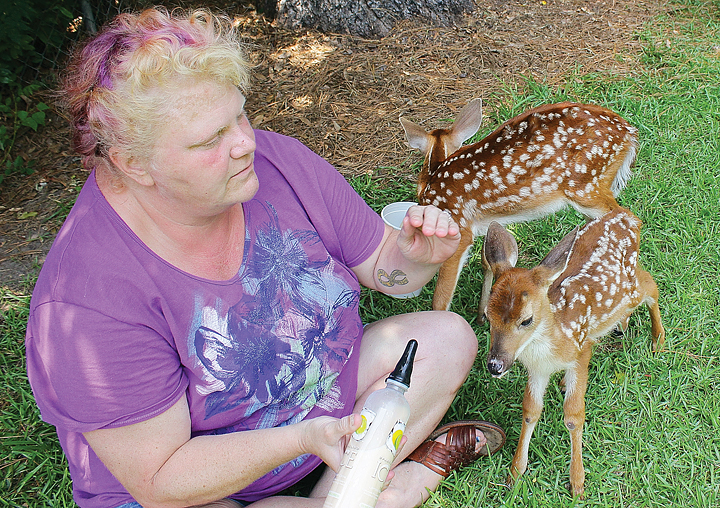From the street, you would never know the house is home to a variety of native wildlife. You could walk past the front porch without noticing the recovering opossum tucked away in a light-tight container. But once inside, the sound of calls, coos and chirps lets anyone know this is no ordinary house.
It is the home of Jennifer Leonard and her family, owner of the nonprofit Coastal Carolina Wildlife Rehab, and home to the abandoned wild animals of southeastern North Carolina fortunate enough to have been rescued.
Leonard, a longtime animal lover and licensed veterinarian technician, is also licensed by the state of North Carolina to serve as a rehabilitator for reptiles, songbirds and small mammals, and the only person within nine counties permitted to rehabilitate fawns.
“I have loved animals since … I was [a small child]. I would drag everything home and my mom would scream. So when I grew up, I became a vet tech,” Leonard said. “After 15 years of marriage, my husband said no more animals … but we compromised on rehabilitating wildlife because they come and go.”
Walking into Leonard’s backyard is unlike walking into any other residential backyard. Upon opening the back door, the seven fawns Leonard is currently rehabilitating scamper around the spacious yard and a few gingerly approach her call for feeding time. In addition to fruits and veggies that are donated to her organization, Leonard feeds the fawns a high-protein formula of goat’s milk, yogurt, heavy whipping cream and a vitamin and mineral supplement. The youngest fawn, Opie, is fed every four to five hours and the older fawns are fed twice daily, eagerly gulping down the rich formula.
Leonard has housed as many as 11 fawns at one time, in 2013, and this year she has already had to treat more with three other local fawn rehabbers gone.
“Up until last year there were three other rehabbers so that would help. I would only see a few fawns,” she said. “Last year I had 31 fawns and this year I have already seen 39, and fawn season is halfway over.”
Most of the fawns Leonard treats are left to fend for themselves when their parents are killed on highways and concerned citizens either bring the stranded animals to her or call her to pick them up. However, recently Leonard said there have been more cases of fawn kidnappings and she urges anyone who finds an abandoned fawn to call her first.
“Fawns are unique because they can walk within 15 minutes of being born, but they can’t keep up with mom, so she parks them out in the open in a backyard or golf course because predators are not going to go out in the open,” Leonard said. “But then you have someone that comes by and thinks it has been abandoned and takes it home.”
Once the fawns make it to Leonard’s home they are cared for until they are about four months old when she releases them in an area around Hampstead surrounded by family farms, one belonging to a former fawn rehabber.
While the fawns are her favorite, Leonard loves tending to all of the abandoned or injured animals brought to her. Inside the house, a fledgling blue jay, whippoorwill and martin are kept in birdcages until ready to fly from Leonard’s door.
Tucked away in socks warmed by an overhead heat lamp are a baby opossum and squirrel. Not even old enough to have any hair on its body, the baby squirrel’s eyes have yet to open.
In another cage nearby, two flying squirrel brothers emerge from an enclosure where the nocturnal animals stay during the day. They were abandoned when their tree was cut down, killing their mother. Older than some of the other small mammals in Leonard’s care, they were going to be released until she noticed one of them showing signs of epilepsy.
With all of the hungry mouths to feed and medical supplies to buy, funding is often a challenge for Leonard. She receives no compensation and pays for everything out of her own pocket.
“Last year we went 11 days without power so I could buy formula for the deer,” Leonard said. “This year we have been pretty lucky to receive donations when they come in.”
Despite the obstacles, Leonard said she would keep serving as a wildlife rehabilitator as long as she could.
“If we don’t step up today … when my son is older he is not going to see deer in the wild,” she said. “We have all got to come together and do something so the younger generation has a chance to experience wildlife in the wild and not at a zoo.”
To report any information about an abandoned wild animal or to make a donation, visit www.coastalcarolinawildliferehab.com or phone 910-612-9127.
email [email protected]




